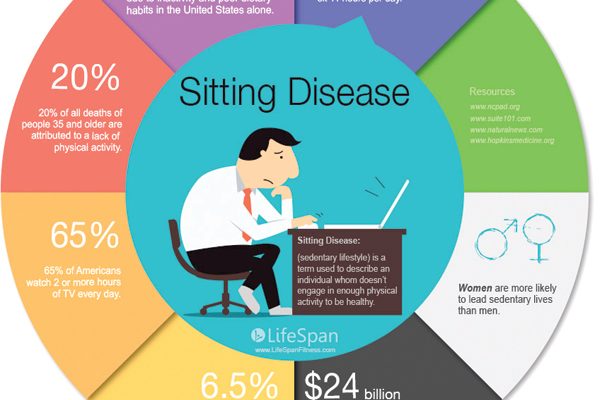

SITTING disease is the term used for health challenges that result from sitting or lying down for too long, which increases the risk of chronic health problems. Too much sitting can also be bad for mental health.
Living a sedentary lifestyle can be dangerous to health; the less sitting or lying down during the day, the better your chances for living a healthy life as it is said that if you stand or move around during the day, you have a lower risk of early death than if you sit at a desk. If you live a sedentary lifestyle, you have a higher chance of being overweight, developing type 2 diabetes or heart disease, and experiencing depression and anxiety.

Sleeping disease is linked to 34 chronic conditions that are commonly associated with lack of activity or excess sitting.
Humans are built to stand upright, the heart and cardiovascular system work more effectively that way. The bowel also functions more efficiently when you are upright. It is common for people who are bedridden in hospital to experience problems with their bowel function. When you are physically active, on the other hand, your overall energy levels and endurance improve, and your bones maintain strength
However, adding movement to your daily routine doesn’t necessarily have to mean starting a rigorous workout program. In general, it’s important to just get up from your chair or couch at several points throughout the day. You can take a quick walk around the block in the morning or march in place while you’re doing the dishes; basically, anything that keeps you moving.
Diseases associated with sitting include legs and gluteals, that is, bum muscles which is weakening and wasting away of the large leg and gluteal muscles used for walking and stabilising.
Weight; moving the muscles helps the body digest fats and sugars and if you spend a lot of time sitting, digestion is not as efficient, so you retain those fats and sugars as fat in your body even when you exercise.
Hips and back pain; the hips will not support you if you sit for long periods as sitting causes your hip flexor muscles to shorten, which can lead to problems with your hip joints. It can also cause problems with your back, especially if you consistently sit with poor posture or don’t use an ergonomically designed chair or workstation. Poor posture may also cause poor spine health such as compression in the discs in your spine, leading to premature degeneration, which can be very painful.
Heart disease: Sitting for long periods has been linked to heart disease. Some experts say that people who are inactive and sit for long periods have a 147 percent higher risk of suffering a heart attack or stroke.
Varicose veins: Sitting for long periods can lead to varicose veins or spider veins as sitting causes blood to pool in the legs.
Deep vein thrombosis: this is a serious health condition where part of a blood clot in the leg vein breaks off and travels, it can cut off the blood flow to other parts of the body, including the lungs, which can cause a pulmonary embolism.
Stiff neck and shoulders: If you spend your time hunched over a computer keyboard, this can lead to pain and stiffness in your neck and shoulders.
Diabetes: Studies have shown that even five days lying in bed can lead to increased insulin resistance in the body and this increases blood sugars.
READ ALSO: Decomposing body found near filing station in Ebonyi








